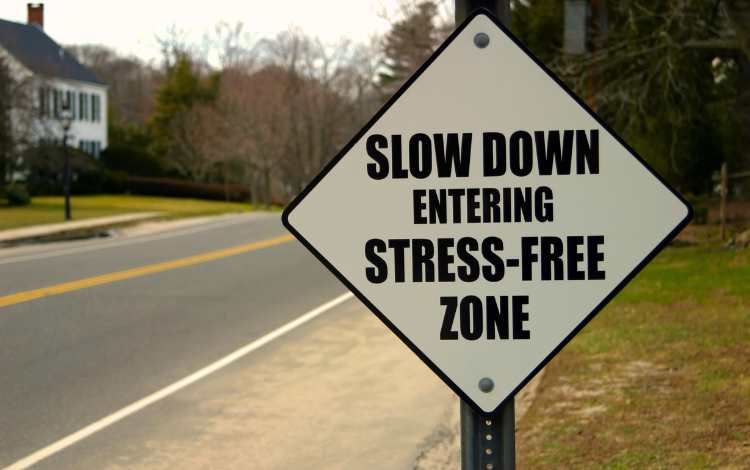
Stress is an inevitable part of life, but how we deal with it can make a world of difference in our overall well-being. Some seem to easily navigate life’s challenges, rarely succumbing to stress. What’s their secret?
It turns out that some specific habits and behaviors can significantly reduce stress in one’s life.
In this article, we will explore 12 habits of people who never get stressed. First, let’s talk a little about the effects of stress.
The Effects of Stress
Browse our online courses on meditation, positive thinking, overcoming procrastination, and freedom from distractions.
While some stress can be motivating and help us perform better, chronic or excessive stress can have detrimental effects on our physical and mental health.
Here are some of the cons of stress and why it’s essential to manage it effectively.
- Health Implications: Prolonged stress can lead to many health issues. It can weaken the immune system, making people more susceptible to illnesses.
- Mental Health Challenges: Stress can take a toll on our mental well-being. It’s a leading cause of anxiety and depression. The constant feeling of being overwhelmed, anxious, or unable to cope can lead to emotional exhaustion and burnout.
- Strained Relationships: Stress often spills over into our relationships. When you are stressed, you may become irritable, less patient, and have difficulty communicating effectively. This strain can affect personal and work relationships, leading to conflicts and misunderstandings.
Habits of People Who Never Get Stressed
So, what are the 12 habits of people who never or rarely get stressed? Let’s begin.
1. Prioritize Self-Care
People who rarely experience stress understand the importance of self-care. They prioritize sleep, exercise, and a balanced diet to keep their physical and mental health in check.
Self-care allows them to handle stressful situations better when they arise.
2. Practice Mindfulness
Mindfulness is a practice that involves being fully present in the moment. We have written a lot about mindfulness on our website.
People who don’t get stressed often incorporate mindfulness techniques into their daily routines, such as meditation, deep breathing exercises, and yoga, to stay grounded and calm.
3. Set Realistic Goals
Setting realistic and achievable goals is crucial in reducing stress.
You need to be aware of limitations and unrealistic goals. You should also avoid taking on too much. Otherwise, you might face failure and disappointment, which you certainly want to avoid.
They can maintain a sense of control and accomplishment by setting attainable goals.
4. Effective Time Management
Efficient time management is critical to minimizing stress. People who rarely get stressed plan their tasks, prioritize responsibilities, and set boundaries to ensure that they have ample time to relax and unwind.
A correct time management plan saves you time and energy and allows you to find time for work, pleasure, and rest.
5. Positive Thinking
Maintaining a positive mindset can significantly reduce stress levels. Those who rarely get stressed focus on the silver linings and solutions rather than dwelling on problems.
These people practice gratitude and maintain a positive outlook on life. This attitude reduces stress and fosters a calmer mind that can deal more easily and positively with obstacles and stressful factors.
6. Strong Support System
Having a solid support system is crucial in times of stress. People who learn to avoid stress nurture meaningful relationships with friends and family, relying on them for emotional support and a listening ear during tough times.
Sometimes, talking about your difficulties and problems can reduce stress and bring to light ideas and plans to deal with the difficulties.
7. Continuous Learning
People who never get stressed are often lifelong learners. They embrace challenges as opportunities for growth and adaptability.
By constantly seeking new knowledge and skills, they feel better equipped to handle whatever comes their way.
8. Delegate and Ask for Help
Delegating tasks and asking for help when needed is a sign of wisdom and self-awareness. Those who rarely get stressed understand the importance of seeking assistance from others, whether in the workplace or at home.
You don’t have to be responsible for everything. You don’t need to do more than you can. If you do, this can lead to stress, frustration, and unhappiness and harm your health.
It would be best to learn to delegate things to others, whether at work or home.
9. Embrace Flexibility
Life is unpredictable, and those who rarely get stressed are adaptable.
They embrace change and are open to adjusting their plans when circumstances shift. This flexibility allows them to navigate challenges with ease.
10. Disconnect from Technology
Constant connectivity to technology can contribute to stress.
People who rarely get stressed consciously disconnect from screens, especially before bedtime, to promote better sleep and reduce stress.
11. Maintain a Healthy Work-Life Balance
Balancing work and personal life is essential for stress reduction. These people set clear boundaries between their professional and personal lives, allowing them to enjoy quality time outside work.
Work is important, but so are family life, rest, and fun. For harmony in life, there needs to be a balance.
12. Grasp the Art of Relaxation
Regular relaxation is a cornerstone of a stress-free life. Those who enjoy a stress-free life engage in hobbies and activities they love, whether reading, gardening, or practicing a musical instrument.
These moments of relaxation recharge their spirits.
Tips for Busy People to Avoid Stress
1. Plan, but don’t over-plan. Planning is valuable for achieving your goals and managing your time effectively, but overplanning can lead to stress and rigid inflexibility. Striking a balance between planning and spontaneity is essential.
2. Set Clear Goals: Begin with clear, achievable goals. Whether they’re related to work, personal life, or a specific project, having a defined objective helps you understand what needs to be done.
3. Create a Flexible Plan: Develop a flexible plan to achieve your goals. Outline the significant steps and milestones required, but leave room for adjustments. Understand that unexpected changes and opportunities may arise.
4. Prioritize Tasks: Identify the most critical and time-sensitive tasks. Prioritization helps you focus on what truly matters and avoid wasting time on less critical activities.
5. Allocate Buffer Time: In your schedule, allocate buffer time for unexpected events or delays. This ensures that a sudden plan change won’t throw you off track.
6. Review and Adapt: Regularly review and adapt your plan as necessary. Be open to tweaking your approach based on changing circumstances or new information.
7. Avoid Micromanagement: Avoid micromanaging every detail. Trust yourself and others to execute tasks without excessive supervision. Overplanning often stems from a lack of trust in your abilities or those of your team.
8. Embrace Spontaneity: Be open to spontaneity. Sometimes, the best opportunities or solutions arise from unexpected situations. Being too rigid in your planning can hinder your ability to seize these moments.
9. Learn from Experience: Reflect on and learn from your planning experiences. Understand when you may have over-planned in the past and use those lessons to strike a better balance in the future.
Conclusion
Stress is a part of life, but by adopting these 12 habits, you can significantly reduce its impact.
People who never get stressed prioritize self-care, practice mindfulness, set realistic goals, and maintain a positive outlook. They lean on their support system, embrace change, and find time for relaxation.
By following these habits, you, too, can lead a calmer and more stress-free life, even in the face of life’s challenges.
Remember that stress is a part of life, but how you respond to it can make all the difference.
Browse our online courses on meditation, positive thinking, overcoming procrastination, motivation, and freedom from distractions.


